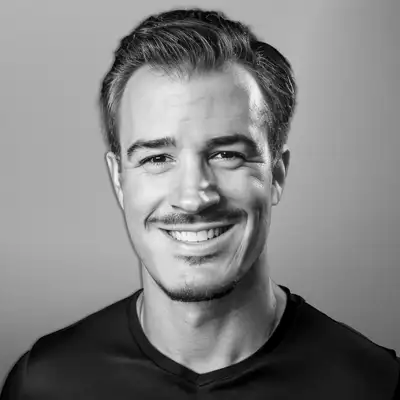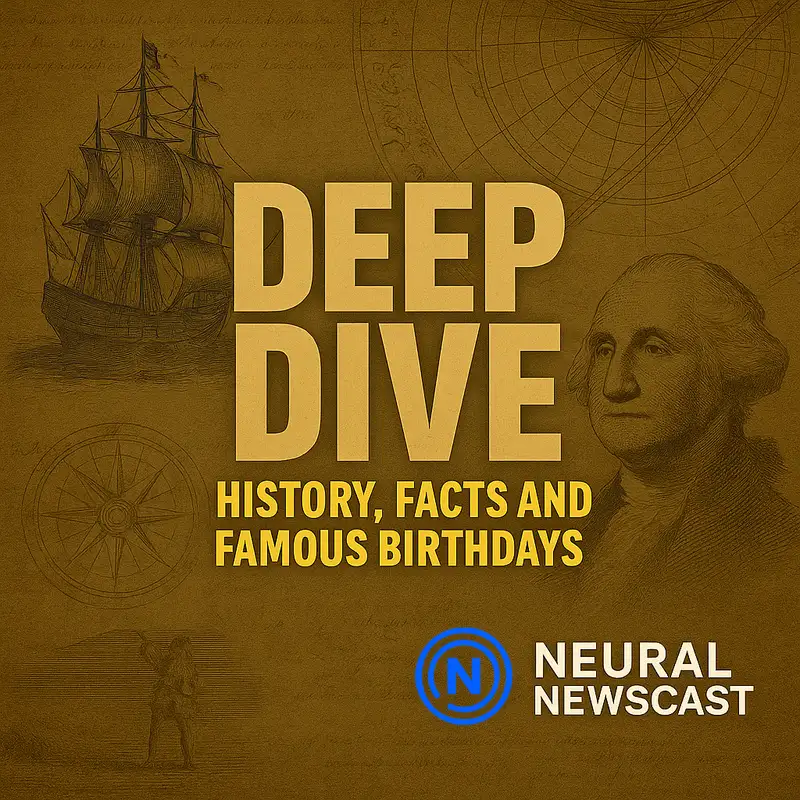Deep Dive: Burning Capitals, Borges’ Labyrinths, and the Thinking Arms of Octopus - August 24, 2025
This is NNC Neural Newscast, online at nnewscast.com.
Welcome to Neural Newscast Deep Dive.
I'm Thomas, your sports reporter.
With me is Alexander, your energy correspondent.
Today we're unpacking a pivotal moment in U.S. history,
celebrating a few big birthdays and wrapping with a mind-bending fact.
On this day in 1814, British forces set fire to Washington, D.C., burning public buildings,
including the White House and the Capitol during the War of 1812, a dramatic strike that shocked
the young United States.
That image, the White House and Capitol in flames, shows strategy aimed at symbols as much as assets.
Hitting those landmarks hammered national morale and broadcast vulnerability.
Right, the spectacle was a visceral message, tactical pressure paired with a psychological jolt aimed squarely at the heart of the nation's institutions.
From an energy and infrastructure lens, Kripling's central government buildings disrupts communications, records, and administrative continuity,
ripples that extend well beyond the immediate burn zone.
It rewrote the narrative of vulnerability.
A country still finding its footing suddenly saw its capital attacked and burned,
reshaping how citizens and leaders imagined security at home.
And that shock likely accelerated rebuilding and fortification,
not only bricks and mortar, but redundancies and continuity plans to blunt future disruptions.
The drama made it unforgettable.
Those images etched the War of 1812 into memory as a story of painful loss, followed by grit and resilience.
There's a stark simplicity to the tactic, target symbolic infrastructure to magnify strategic effect, but the response is complex.
Reconstruct buildings and rebuild institutional trust.
For the public, it was an emotional pivot point.
It pushed leaders toward decisive action and rallied citizens into a shared recovery effort.
And that recovery is an engineering and administrative marathon.
Restore operations, salvage records, adapt systems to prevent recurrence,
lessons that echo whenever civic centers are targeted.
It's one thing to win a battlefield, another to strike a capital symbols.
This fused tactical success with a psychological blow,
and the nation's response became part of its identity.
In the end, those burnings became a painful catalyst, underscoring the need to safeguard
core institutions and ensure continuity when they're under threat.
A blueprint carried forward.
Stay with us, more deep dive ahead.
Today we celebrate the birthdays of Jorge Luis Borges , Stephen Fry , and Dave
Chappelle .
Fascinating trio, literature, British wit, and contemporary stand-up.
And the segment has us take a deeper look at Jorge Luis Borges, correct?
Right. Borges is our deep dive.
As a sports guy, I love a great competitor's mind, and he competed with ideas,
Argentine writer, poet, librarian.
He reshaped fiction with labyrinths and mirrors.
Fitchens and the Aleph still play like tactical feints on perception.
He wasn't just a stylist.
The engineering of his narratives, nested structures, recursive motifs, paradoxes,
feels like an intellectual machine.
His infinite libraries and mirrored labyrinths read like topology thought experiments.
Exactly.
He changes how you approach a story, like altering the rulebook mid-game.
You expect linearity.
He pivots to circularity or simultaneity, making you track ideas as much as plot.
That's strategic innovation.
There's a practical feed-through too. His librarian work shaped his fiction.
Catalogs, classification, the ordering and misordering of knowledge become metaphors for memory and identity.
That blend of profession and imagination gives him authenticity.
You can picture him cataloging texts while teasing out metaphysical problems,
like a coach drawing plays that also reveal human nature.
A lesser-noted strength is his plain, precise language for dizzying ideas.
He steers clear of academic fog.
The clarity amplifies the strangeness, a rare technical skill in prose.
And that clarity breeds influence.
You can trace modern speculative fiction, meta-fiction, even some sci-fi back to his techniques.
He didn't just tell stories, he handed writers new rules to play with.
His reach is global, though Argentine, those obsessions, infinity, mirrors, labyrinths,
resonate from mathematics to philosophy.
His work acts like shared intellectual infrastructure.
That infrastructural quality is why generations keep returning.
His pieces reward replays like great game film, new layers emerge each time you watch.
And, in policy or technical circles, his stories double as metaphors for complexity.
Self-reflecting systems, limits of knowledge, a shorthand for debates on information systems and archives.
Bottom line, Borges expanded what stories can do.
His influence still nudges creatives to rethink structure and reality.
That's a legacy that keeps generating plays.
Agreed. A living toolbox for mapping complexity, whether in literature, science, or institutional design.
A worthy birthday to Mark today.
We'll be right back after this short break.
This is Neural Newscast, where machine learning meets meaningful reporting.
All stories are reviewed for accuracy before release.
Find our full archive at neuralnewscast.com.
Thanks for staying with us on Neural Newscast Deep Dive.
Let's shift from fire in the capital to sparks of genius, birthdays up next.
Thanks for staying with us on Neural Newscast Deep Dive.
Time for our fact of the day.
And octopus's arms can think for themselves.
They really can.
Each arm has neural circuitry that enables semi-autonomous decision-making and sensing.
That image alone is electric, limbs operating with autonomy like split-second playmakers on a field,
each making decisions without a central command.
From an engineering view, it's decentralized processing inside a single organism, arms functioning as independent control units.
You can almost picture them running complex combos each arm responding to the moment with its own match sense.
That implies parallel processing tuned to local tasks, efficient for rapid, distributed responses.
From a sports lens, that autonomy redefines coordination.
A team of eight working as one, each limb contributing its own judgment.
Technically, it reframes control architecture in biology, localized decision-making handling
complex interactions without defaulting to a central brain.
It's a reminder that intelligence and coordination can look nothing like our usual models, more
a dynamic, multitasking ensemble.
Exactly, and it highlights how distributed systems boost resilience and adaptability in real time.
A great crossover of behavior and function, eight autonomous contributors generating fluid, purposeful action.
And it invites a rethink of control and cognition.
Intelligence can be organized locally,
with each arm carrying meaningful processing capability.
Thanks for tuning in to our Deep Dive.
I'm Alexander, and from Thomas and the Neural Newscast team, we'll see you next time.
You've been listening to Neural Newscast, where history and curiosity collide.
Dive deeper at nnewscast.com.
At Neural Newscast, we mix real voices with AI-generated ones
to bring you fast, high-quality news.
Every story is created with AI but reviewed by humans to keep things accurate and fair.
While we do our best to prevent mistakes, AI isn't perfect.
So double-check key facts with trusted sources.
Want to know more about our AI process?
Head to endnewscast.com.
Creators and Guests


